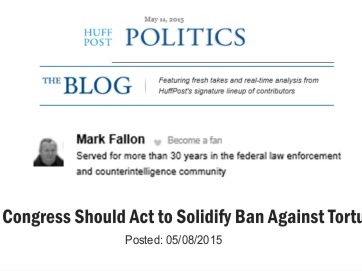Mark wrote a commentary for a special edition of the Journal of Applied Cognitive Psychology about some of the latest emerging research about interviews, interrogation and detecting deception. Mark explained that the lack of evidence-based research on interrogation created a murky claimant, where proponents of torture were able to cherry-pick information with dubious claims that abusive interrogations and torture would be effective.
Category Archives: Op-Ed/Articles
Congress, Administration Must Renew Efforts to Close Guantanamo
In an Op-Ed in The Huffington Post, Mark wrote that America would be judged, and judged harshly, for not closing the Guantanamo Bay prison sooner, as it has become a strategic liability and a symbol of injustice, oppression and torture.
Surviving, Evading, Resisting and Escaping (SERE) Accountability
Mark wrote an Op-Ed published in the Huffington Post on how it’s time for President Obama and Congress to take bipartisan action to ensure we never venture into the dark side and torture again.
Using Science to Improve the Practice of Interviewing and Interrogation
Mark co-authored an article published in Police Chiefs Magazine about how research can improve the practice of interrogation and how the research studies offer an unprecedented perspective on the challenges, successes and mediations of overcoming resistance and collecting important information from non-cooperative sources.
Time’s Up on Gitmo, Mr. President
Mark wrote an Op-Ed published in the NY Daily News Mark urges President Obama to move aggressively to transfer detainees cleared for release from GTMO and to bring terrorists to justice, real justice and constitutional justice, citing it’s not just President Obama’s legacy at stake; it’s ours.
Dick Cheney Was Lying About Torture
It’s official: torture doesn’t work. Waterboarding Khalid Sheikh Mohammed, the mastermind of 9/11, did not in fact “produce the intelligence that allowed us to get Osama bin Laden,” as former Vice President Dick Cheney asserted in 2011. Those are among the central findings of the Senate Intelligence Committee report on CIA interrogation and detention after 9/11.
The report’s executive summary is expected to be released Tuesday. After reviewing thousands of the CIA’s own documents, the committee has concluded that torture was ineffective as an intelligence-gathering technique. Torture produced little information of value, and what little it did produce could’ve been gained through humane, legal methods that uphold American ideals.
I had long since come to that conclusion myself. As special agent in charge of the criminal investigation task force with investigators and intelligence personnel at Guantanamo Bay, Afghanistan, and Iraq, I was privy to the information provided by Khalid Sheik Mohammed. I was aware of no valuable information that came from waterboarding. And the Senate Intelligence Committee—which had access to all CIA documents related to the “enhanced interrogation” program—has concluded that abusive techniques didn’t help the hunt for Bin Laden. Cheney’s claim that the frequent waterboarding of Khalid Sheikh Mohammed “produced phenomenal results for us” is simply false.
The self-defeating stupidity of torture might come as news to Americans who’ve heard again and again from Cheney and other political leaders that torture “worked.” Professional interrogators, however, couldn’t be less surprised. We know that legal, rapport-building interrogation techniques are the best way to obtain intelligence, and that torture tends to solicit unreliable information that sets back investigations.
Yes, torture makes people talk—but what they say is often untrue. Seeking to stop the pain, people subjected to torture tend to say what they believe their interrogators want to hear.
The report is essential because it makes clear the legal, moral, and strategic costs of torture. President Obama and congressional leaders should use this opportunity to push for legislation that solidifies the ban on torture and cruel treatment. While current law prohibits these acts, US officials employed strained legal arguments to authorize abuse.
A law could take various forms: a codification of the president’s 2009 executive order banning torture, for example, or an expansion of the 2005 Detainee Treatment Act so that key protections in it would apply to the CIA as well as the military. However it’s designed, a new law would help the country stay true to its ideals during times of crisis and guard against a return to the “dark side.”
And dark it was. Terms like “waterboarding” and “enhanced interrogation” obscure the brutal, sometimes bloody, reality. It was about the delivery of pain. The U.S. government authorized previously taboo techniques, which—along with a take-the-gloves-off message coming from the top—led to even greater horrors. You can draw a line from the “enhanced interrogation” to the barbarism of Abu Ghraib.
The ostensible purpose of torture was to save lives, but it has had the exact opposite effect. Torture was a PR bonanza for enemies of the United States. It enabled—and, in fact, is still enabling—al Qaeda and its allies to attract more fighters, more sympathizers, and more money.
Some have argued against releasing the report because they predict that it will spark anti-American anger around the world. Such a possibility, however, is an argument not against the kind of transparency and Congressional oversight inherent to a well-functioning democracy; it’s an argument against torture. Indeed, by employing such an argument, people are implicitly acknowledging that torture saps the country’s credibility and threatens its national security.
Over the coming days, you’ll be hearing numerous torture defenders claim it kept Americans safe. Don’t believe them. Many of us charged with the mission of getting information out of terrorists didn’t resort to using torture. Like many Americans, we didn’t want our government to use torture, and we hope it never does again.
Mark Fallon served as an interrogator for more than 30 years, including as a Naval Criminal Investigative Service special agent and within the Department of Homeland Security, as the assistant director for training of the Federal Law Enforcement Training Center.
Congress Should Act to Solidify Ban Against Torture
At this point we all know that, in President Obama’s words, “We tortured some folks.” The Senate Select Committee on Intelligence’s report on the CIA’s rendition, detention, and interrogation program revealed shocking abuses that went far beyond even the torture that the administration had authorized. The Senate report represents a victory for transparency.
But the story doesn’t end there. The government went to great lengths to cover for its official policy of abuse, and some of that is just now coming to light.
Just last week a group of dissident health professionals and human rights activists issued a report that contends that the American Psychological Association (APA) secretly collaborated with the CIA “to bolster a legal and ethical justification for the torture of prisoners swept up on the post-Sept. 11 war on terror.”
After the 9/11 attacks I was appointed the Special Agent in Charge of the Department of Defense task force to investigate terrorists for military commission trials. In 2002, I became aware of cruel treatment of detainees, and I witnessed heroic, moral leaders who took a stand against torture–interrogators, law enforcement professionals, lawyers, and yes, psychologists. Unfortunately our warnings weren’t heeded, and the administration continued its policy of brutality.
I want to make sure America is never in the same situation again, so for the last six years I’ve served on the High Value Detainee Interrogation Group (HIG) Research Committee, currently as chair of the committee. Composed of research scientists, government experts, psychologists, journalists, and human rights advocates, the HIG research committee studies the most effective means to lawfully and humanely obtain accurate and reliable national security information from high value targets.
Had the HIG existed in 2001, policy makers would undoubtedly have resisted turning to the dark side. They would have known that not only are abusive interrogation techniques wrong; they’re also ineffective. They would have known the thoroughly researched scientific backing for that conclusion. And they would have known what humane and legal techniques actually work.
The report on the APA sheds light on the fact that unless we as a nation close the loopholes that allowed torture to take place, proponents will continue to use any rationale to justify the practice. The attorney general or Congress should appoint an independent counsel to investigate if there was an intentional manipulation of the APA to give the CIA the legal cover for torture. An independent counsel would avoid the conflict of interest inherent when the government investigates itself and would have the ability to delve into the conspiracy of torture and the cover-up of torture related offenses.
At the same time, to make sure the United States never again sanctions torture, we need legislation. Next week the Senate Armed Services Committee will markup with 2016 National Defense Authorization Act. It should take this opportunity to ensure that all U.S. officials–including the CIA and the intelligence community–abide by humane interrogation standards.
Senator John McCain reminded us who we are as a nation when he took the Senate floor on the day the torture report was released. He said, “The truth is sometimes a hard pill to swallow….but the American people are entitled to it, nonetheless….We need only remember in the worst of times, through the chaos and terror of war, when facing cruelty, suffering and loss, that we are always Americans, and different, stronger, and better than those who would destroy us.”
America isn’t great because we never make mistakes–far from it. It’s our ability to admit our mistakes and to recover from them that determines our greatness. The Senate report was a step in that direction, but we need to solidify the ban against torture to truly emerge from the dark side and stand in the light.
Follow Mark Fallon on Twitter: www.twitter.com/glynco

